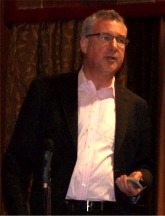|
|
Cancer professor urges
North West to unite
15.07.08
PEOPLE in Donegal have
been urged to band together with the rest of the
North West to lobby for one specialist cancer
centre.
But Professor John Crown who was keynote speaker at
the Donegal Action for Cancer Care (DACC) conference
'Up Here We're Dying to Live', warned that the
people of the Donegal, Leitrim and Sligo would first
have to agree upon where that centre would be built.
He said the region would have around 250,000 people
in the coming years and this would be enough
critical mass to support a comprehensive cancer
centre. Some small cities in the US with around the
same population support two such centres, he said. |
"You need to get
together and form a North Western cancer action
group. You should come together and say we don't
care where it (cancer centre) is but some place
within this tri-county area we are going to push for
one comprehensive cancer centre which will have all
the surgery, all the radiotherapy and the
mammography will be read by a good mammographer."
Prof Crown said he believed there has been an
attempt to "buy off" Donegal by giving the county a
partial cancer service.
Meanwhile, Prof Crown was scathing of |
 |
the National Strategy
for Cancer Control's proposed centres of excellence.
"When I hear them talking about the proposed new
centres of excellence... I mean saying that a centre
is going to be excellent before one brick has been
put down to build the centre, is a bit like looking
into your lover's eyes over a glass of champagne and
deciding that the baby you will create is going to
become a piano virtuoso," he said.
Meanwhile, he said Ireland had a 'Paris Hilton
health service' where the wealthy get seen quickly
and the poor languish on hospital waiting lists. |
 |
Prof Crown, medical
oncologist at St. Vincent's Hospital, Dublin,
likened patients' choices within the new national
co-location plan to the wealthy hotel heiress
getting on a plane.
"Paris once famously said that when she got into an
airplane she wanted to make sure she was always
turning left into first |
class and not turning
right into coach," said Prof Crown.
"The new plan for co-located public and private
hospitals should just be called the 'Paris Hilton
System' because that is what it's going to be. You
will walk into the hospital corridor, turn left for
the co-located private (hospital) and turn right for
the co-located public."
He described the co-location model as "insane".
"It's insane and what makes it insane is that we
have different funding mechanisms and they
incentivise different treatment behaviours.
"If the bureaucrats think they can legislate
fairness into these co-located campuses they're
wrong because with the private, the hospital is
getting paid for treating patients and the doctor is
getting paid for treating patients while with the
public, doctors are being paid to keep patients on
waiting lists," he said.
The medical oncologist referred to the late Susie
Long who died of colon cancer after waiting as a
public patient for a colonoscopy for eight months.
"I believe Susie was killed because of the health
system. There is no rational health system in the
world that makes people wait for a colonoscopy. It
just doesn't happen," he said. And he said Ms.
Long's wait for treatment was not an isolated case.
He recently learned of an 80 year old woman who
could not be told even what year her cataract
operation would take place. She "only wanted to read
her prayer book", he said. He said the current wait
for patients in the west to see a rheumatology
specialist was 18 months despite clinical research
showing that young rheumatoid arthritis patients, in
particular, needed to be treated urgently.
Also speaking at the conference in the Mount Errigal
Hotel on Saturday was T.D., and GP, Dr. James McDaid
who stressed the need for diagnostic equipment to be
made available in the primary healthcare centres of
the future.
Meanwhile, Prof Crown hit out at Ireland's shortage
of consultants and "crushing patient load". He
acknowledged a 'very large grant' from the Health
Research Board this year that has allowed him to
devote more time to research. But he revealed that
while in full-time clinical practice, he was seeing
90 to 100 patients a day most days of the week.
"There is no country in the world where a cancer
specialist sees 90 to 100 patients a day," he said,
outlining the resulting "huge risk implications,
hurried consultations and unbelievably awful record
keeping". He hit out at the HSE's "burgeoning army
of spin doctors" and the practise of spending money
on PR people instead of clinical specialists.
Prof Crown, whose late father was from Manorhamilton
in Co Leitrim, urged DACC and the people of the
north west to band together and lobby for one
specialist cancer centre. But he warned they would
first have to agree upon which hospital - either
Sligo or Letterkenny - it would be located.
And he was scathing of the centres of excellence
proposed under the National Cancer Strategy for
Cancer Control.
"When I hear them talking about these proposed new
centres of excellence... I mean saying that a centre
is going to be excellent before one brick has been
put down to build the centre, is a bit like looking
into your lover's eyes over a glass of champagne and
deciding that the baby you will create is going to
become a piano virtuoso,” he said. He praised the
strides being made to boost Irish cancer survival
rates but called for the bureaucracy to be taken out
of the healthcare system. He urged policy makers to
adopt a universal single-tier social insurance
system based on the Austrian, Swiss and German
models. This would see every person in Ireland pay
the same percentage of their income to a
not-for-profit national health insurance scheme. For
Prof Crown's views on the Lisbon Treaty and his
"penniless" father,
click here . |
|

